Quaker parrots, also known as monk parakeets, are beloved for their vibrant personalities, talking abilities, and affectionate nature. These medium-sized parrots are not just popular for their colorful appearance but also for their ability to form strong bonds with their owners. If you’re considering adding a Quaker parrot to your family, it’s essential to understand the Quaker Parrot Cost costs associated with their purchase and care.
In this comprehensive 2024 price guide, we’ll break down the expenses of acquiring and maintaining a Quaker parrot, including initial purchase, setup costs, ongoing care, and hidden expenses you should be aware of.
How Much Does a Quaker Parrot Cost?
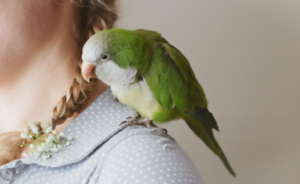
The cost of a Quaker parrot varies based on factors such as its age, color mutation, and the breeder or seller. On average, the price ranges between $250 and $800.
Price Range by Source:
- Breeders: $250–$600
- Pet Stores: $300–$800
Adoption/Rescue Centers: $50–$200 (depending on availability and adoption fees)
Factors Affecting the Price
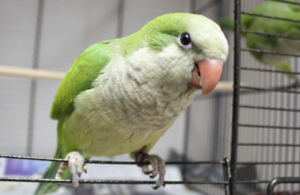
Several elements influence the cost of a Quaker parrot. Here’s a breakdown of the key factors:
1. Age
- Baby Quakers: Usually more expensive as they require hand-feeding and training. Prices range from $300 to $800.
- Adult Quakers: Slightly cheaper, typically between $250 and $600, depending on their training and socialization.
2. Color Mutation
Color variations significantly impact the cost of Quaker parrots. While the standard green Quaker parrot is the most common and affordable, rarer mutations fetch higher prices.
- Green: $250–$500
- Blue: $400–$700
- Pallid Blue: $500–$800
- Yellow (Lutino): $800–$1,200
- Albino: $1,000–$1,500
3. Breeder Reputation
Reputable breeders often charge higher prices for their birds because they provide healthier, well-socialized parrots. Purchasing from a trustworthy breeder ensures the bird has been ethically bred and is free from genetic diseases.
4. Location
The price of Quaker parrots can vary depending on your geographical location. In areas where they are more common, prices tend to be lower, while in regions with stricter laws or fewer breeders, costs may increase.
Additional Costs of Owning a Quaker Parrot
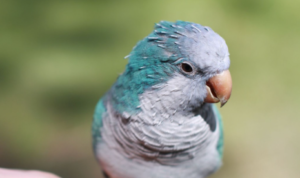
Purchasing a Quaker parrot is just the beginning. Proper care requires an investment in their habitat, diet, toys, and healthcare. Let’s explore these ongoing expenses:
1. Cage
Quaker parrots are active birds that need a spacious cage. The recommended size is at least 24” x 24” x 24”.
- Cost: $100–$400
- Look for cages with bar spacing of ½ inch to prevent injuries.
2. Accessories
- Perches: $15–$50
- Food Bowls: $10–$30
- Toys: $20–$100 (Quakers love chewing and foraging toys, so these will need regular replacement.)
3. Food
Quaker parrots thrive on a diet of pellets, fresh fruits, vegetables, and occasional seeds.
- Monthly Cost: $20–$50
4. Veterinary Care
Regular check-ups and emergency care are crucial to your parrot’s health.
- Annual Check-Up: $50–$200
- Emergency Care: $100–$1,000 (depending on the severity of the issue)
5. Miscellaneous Expenses
- Travel Carrier: $30–$100
- Grooming Tools (nail clippers, beak conditioner): $10–$30
Are Quaker Parrots Legal in Your Area?
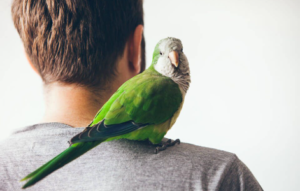
Before purchasing a Quaker parrot, ensure they are legal in your area. Due to their ability to form large feral colonies and cause agricultural damage, some states in the U.S. have restrictions or bans on owning them.
- States Where Quakers Are Banned: California, Georgia, Hawaii, Kentucky, Pennsylvania, Tennessee, and Wyoming.
- States with Restrictions: Texas, Connecticut, and New Jersey require permits.
Check local laws and regulations to avoid legal complications.
Benefits of Owning a Quaker Parrot
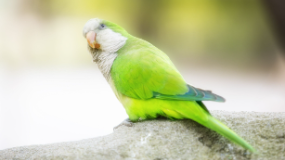
Despite their costs, Quaker parrots are worth the investment for many bird enthusiasts. Here are some reasons why:
- Intelligent and Trainable: Quakers are excellent mimics and can learn an impressive vocabulary.
- Affectionate: They bond closely with their owners and enjoy being part of family activities.
- Entertaining: Known for their playful and curious personalities, they bring endless joy.
Tips for Reducing Costs
If you’re on a budget, consider these cost-saving tips:
- Adopt Instead of Buy: Many parrots are available for adoption at a fraction of the cost.
- DIY Toys and Accessories: Use household items to create safe, engaging toys.
- Buy in Bulk: Purchase food and supplies in larger quantities to save money.
- Research Local Breeders: Compare prices and negotiate if possible.
Conclusion
Owning a Quaker parrot is a rewarding experience, but it comes with financial responsibilities. By understanding the costs associated with purchasing and caring for these intelligent birds, you can make an informed decision and provide a loving home for your new companion.
Whether you’re captivated by their talking abilities, playful antics, or unique personality, a Quaker parrot can bring years of joy to your life. Just remember to budget for their long-term care and ensure they receive the attention and love they deserve.
Would you like to know more about Quaker parrot care or training tips? Let us know!
